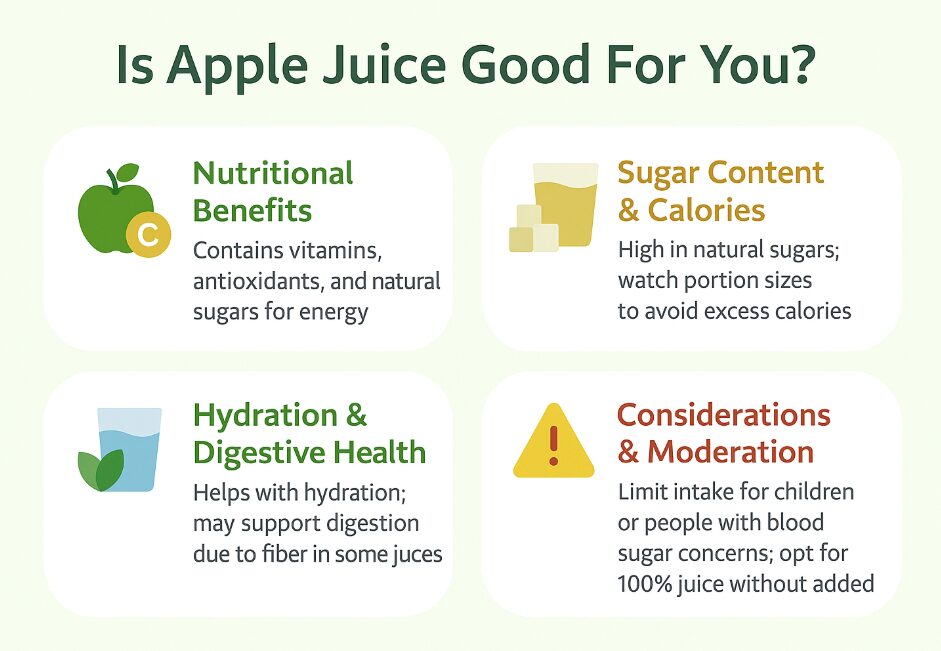Is Apple Juice Good For You?
Apple juice is one of the most popular fruit drinks worldwide. You’ll find it in school cafeterias, hospital trays, and almost every grocery store. But as health advice shifts toward reducing sugar and increasing whole foods, you may wonder: Is Apple Juice Good For You? The answer depends on how much you drink, the type of juice, and your overall diet. Let’s take a closer look.
The Nutrition Basics of Apple Juice
A standard 8-ounce (240 ml) glass of 100% apple juice provides roughly:
-
Calories: 110
-
Sugar: 23–25 grams (naturally occurring fructose and glucose)
-
Vitamin C: About 100% of the daily value (if fortified; otherwise 2–8%)
-
Potassium: Around 250 mg (6% of daily needs)
-
No fiber (since juicing removes most of the pulp)
Compared to whole apples, apple juice delivers the same natural sugars but misses out on dietary fiber, which is essential for digestion and blood sugar control.
Health Benefits Of Apple Juice
1. Hydration and Energy
Apple juice is about 88% water, making it a good option for hydration. The natural sugars can give you a quick energy boost, which is why it’s often served after medical procedures or during mild illness recovery.
2. Antioxidants
Apples are rich in plant compounds like polyphenols, which may help reduce oxidative stress and support heart health. While much of the antioxidant content is found in the apple skin (often lost during juicing), commercial juices still retain some protective compounds.
3. Gentle on the Stomach
Because it’s low in fiber and easy to digest, apple juice is often recommended for children and adults recovering from stomach flu or surgery. It provides calories without overwhelming the digestive system.
The Downsides
High Sugar Content
One 8-ounce glass of apple juice has about the same sugar as a can of cola. The difference is that juice sugars are natural, but your body still processes them in a similar way, which can cause blood sugar spikes if consumed in excess.
Lack of Fiber
Whole apples provide about 4 grams of fiber, which slows digestion, promotes fullness, and helps regulate cholesterol. With juice, you miss out on those benefits.
Dental Concerns
The natural sugars and acidity in apple juice can wear down enamel, especially if you sip it throughout the day. Dentists often recommend drinking juice in moderation and rinsing with water afterward.
How Much Apple Juice Should You Drink?
Health organizations suggest treating juice as an occasional beverage rather than a daily staple:
-
Children (ages 1–6): No more than 4–6 ounces per day (American Academy of Pediatrics, 2017).
-
Children (ages 7–18): Up to 8 ounces per day.
-
Adults: Limit to about 1 small glass (8 ounces) per day, if at all.
If you love apple juice, the best choice is 100% juice with no added sugar. Diluting it with water can also reduce sugar intake while still enjoying the flavor.
Healthier Alternatives
If you’re reaching for apple juice daily, consider:
-
Whole apples: More fiber, more filling, and lower sugar per serving.
-
Sparkling water with a splash of juice: Refreshing with fewer calories.
-
Homemade smoothies: Blend apples with the skin on to retain fiber.
Frequently Asked Questions
Is apple juice good for weight loss?
Not really. Because it’s high in sugar and low in fiber, apple juice won’t keep you full for long. Whole apples are better for weight management.
Is apple juice good for the kidneys?
In moderation, yes. Apple juice contains potassium, which supports kidney health. However, individuals with advanced kidney disease may need to limit potassium-rich foods, so consult your doctor.
Does apple juice help with constipation?
Yes, especially in children. Apple juice contains sorbitol, a natural sugar alcohol that can help soften stools. But prune juice is usually more effective.
Is cloudy (unfiltered) apple juice healthier than clear juice?
Yes. Cloudy apple juice retains more of the fruit’s natural polyphenols and antioxidants, making it slightly more beneficial than filtered clear juice.
Can apple juice replace water for hydration?
It helps with hydration but should not replace water. The sugar content makes it less ideal than plain water for daily fluid needs.
Drinking apple juice has its perks, its hydration, quick energy boost, and plant compounds make it appealing. These apple juice benefits are best enjoyed in moderation, as juice is high in sugar and lacks the fiber of whole apples. Treat it as a supplement to your fruit intake, not a replacement.
Ultimately, eating a whole apple is healthier than drinking juice. If you pour a glass, keep it small, savor each sip, and pair it with nutrient-rich whole foods for balance.

